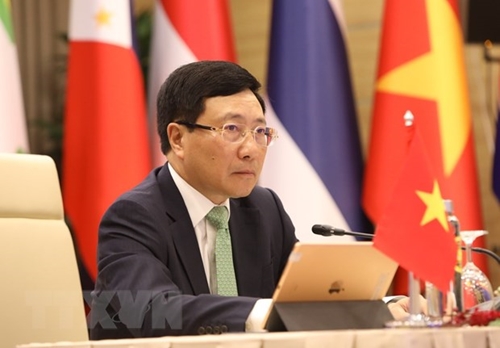The online conference, which also saw the participation of foreign ministers from Cambodia, Laos, Myanmar, and Thailand, also discussed measures to bolster trade and investment cooperation to speed up economic recovery in each country following the pandemic.
In his speech, Minh emphasized the need for a comprehensive approach that both responds to the pandemic and recovers the economy.
While sharing Vietnam’s experience in containing the disease, he affirmed the timeliness and effectiveness of the comprehensive policies adopted by the Vietnamese Government.
    |
 |
|
Vietnamese Deputy Prime Minister and Minister of Foreign Affairs Pham Binh Minh |
Vietnam is continuing to apply measures to control and prevent the spread of COVID-19 while at the same time gradually reopening its economy, Minh said.
Mekong-Japan cooperation could effectively support the economic recovery process of member countries by giving priority to fields that help restore regional supply chains, stimulate consumption, and strengthen the capacity of health systems, he stressed.
Minh proposed specific groups of solutions, including strengthening the complementariness and enhancing the general strength of economies, in particular promoting enterprises’ investment in infrastructure projects; supporting the industrialization process in Mekong countries; facilitating trade and investment cooperation; and creating favorable conditions for high-quality goods from Mekong countries to enter Japan.
He also highlighted the significance of increasing human resources for healthcare facilities, improving Mekong countries’ capacity to monitor diseases, produce vaccines, and build laboratories; and urgently implementing the “Mekong-Japan Initiative for Sustainable Development Goals (SDGs) towards 2030,” especially in the context of the Mekong River basin being seriously affected by severe drought and saline intrusion.
The Deputy PM also expressed his sympathy with the Japanese people over the losses of life and property from to the recent floods and thanked Japan for its valuable assistance to Vietnam in the fight against COVID-19.
Participants reaffirmed the need to strengthen joint efforts in preventing the disease and promote economic recovery in the context of complicated movements in the global economic situation.
Regarding health cooperation and disease prevention, the delegates agreed to promote transparent and timely information sharing among countries on policies and measures to respond to COVID-19; expand cooperation in epidemiological research and attract resources for anti-viral vaccine development and production; and cooperate to improve national health systems in each country.
They agreed to strengthen cooperation in ensuring the operation of regional supply chains, supporting small- and medium-sized enterprises to adapt to new circumstances, maintaining trade and investment flows, and enhancing scientific and technological applications in agricultural production; and developing high quality infrastructure.
The ministers highly valued the cooperation between Japan and the Mekong region in the fight against the COVID-19, and applauded initiatives proposed by the Japanese side at the meeting.
Accordingly, the Government of Japan will provide USD 56 million worth of medical equipment and technical training for health workers in Mekong countries and provide at least USD 50 million to regional countries to improve their capacity to cope with the pandemic; provide a loan to support the emergency response to the COVID-19 crisis; and deploy the KUSANONE Mekong initiative for the SDGs with total non-refundable aid of JPY 1 billion (USD 9.3 million) to help Mekong countries implement projects on improving public health, education, agricultural productivity, and building clean water systems and improving the living environment.
Source: VNA